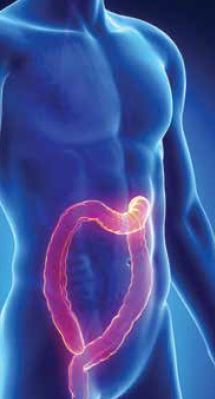Health Check: Cheating Colon Cancer
Improve digestion and prolong colorectal health with these simple tips.
 First, what is the colon? It consists of several feet of soft intestine, and it combines with the rectum to form the large intestine. The colon’s function is to remove water and salt from solid waste before it exits your body.
First, what is the colon? It consists of several feet of soft intestine, and it combines with the rectum to form the large intestine. The colon’s function is to remove water and salt from solid waste before it exits your body.
Many people have preconceived notions about colon cancer — a disease that is the third most-common cancer diagnosed in the United States. Here’s to setting the record straight: Although more men have colon cancer than women, the number of women diagnosed with colon cancer is increasing. The cancer usually begins as a polyp, or a small, fleshy growth, on the interior lining of the colon or rectum.
Polyps can be benign (harmless) or malignant (liable to cause cancer); if detected early enough, polyps can be removed before they spread or become cancerous. That’s why it’s crucial for both men and women to schedule regular colonoscopies starting at age 50, or sooner if the patient’s family has a history of colorectal cancer. Follow these tips to maintain a healthy large intestine.
Colon Corrections
Exercise. You already know that exercise provides a number of health benefits. One of these benefits is improved colon health, likely related to a strengthened immune system, little to no inflammation in the colon and reduced levels of insulin. The proof is in the research: A recent study in the Journal of Sports Medicine found that men and women who exercised consistently for 10 years had a significantly lower risk of dying from colon cancer after being diagnosed than their more sedentary cohorts.
Get your Vitamin D. Americans’ average dietary intake of Vitamin D — the name given to a group of fat-soluble substances that the body can turn into hormones — is below average. According to the National Cancer Institute, higher intakes of Vitamin D have been associated with lower levels of colorectal cancer.
Consider supplements. Along with Vitamin D, several dietary supplements may be beneficial to colon health. These include selenium and curcumin; and according to a study by the University of Oxford, a daily aspirin regimen may also lower the risk of colorectal cancer.
Eat your fruits and vegetables. Diets high in fiber, which is found naturally in many fruits and veggies, have been shown to decrease the risk of colon cancer. Focus on the cruciferous family of vegetables, including kale, broccoli, cauliflower and bok choy. These veggies have plenty of glucosinolates: sulfur-containing compounds that have been linked to prevention of many forms of cancer, including colorectal cancer.
Cut back on meat. Consumption of meat, especially the red and processed varieties, has been associated with an increased risk of colorectal cancer. Processed meats include smoked, cured or salted meats, which may contain chemical preservatives like nitrates. Limit meat intake to about one pound per week, and pay attention to your cooking temperatures — high-heat cooking options like frying, grilling and broiling are partially responsible for the production of chemicals linked to cancer.
